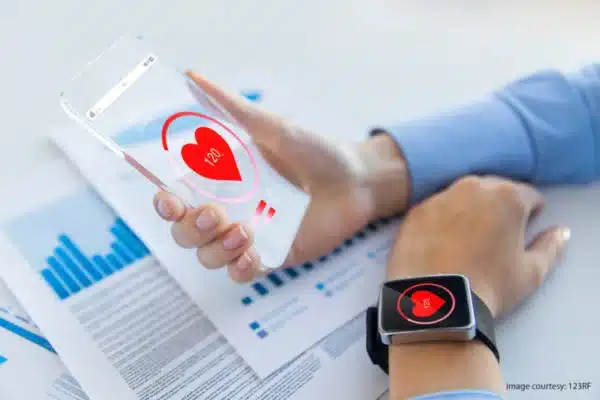It’s the age of wearable tech. And the healthcare spend in wearables, according to industry research, will touch $60 billion by 2023. Although the concept was introduced in the late 1990s, it’s only over the last decade, with the influx of all-pervasive smartphones, that wearable health tech devices have gained such popularity globally.
From sleek fitness trackers and smartwatches to portable heart monitors and sleep trackers, these innovative devices not only help prevent chronic diseases by monitoring one’s health status on a regular basis, but also provide more data to clinicians to enable early diagnosis and timely treatment.
Here’s looking at five wearable health tech devices that are revolutionising healthcare:
# Fitness trackers & watches
Measuring one’s vitals and activity levels has never been this easy. Although the market is inundated with fitness trackers and smartwatches, not all of them are accurate and effective. So, it’s important to choose well.
For those looking for a heart rate and activity tracker, the Samsung Gear Fit 2 Pro is a great buy. As is the Amazfit Bip armed with multi-sport tracking and sleep tracking. Fitbit Charge 3, Garmin Vivofit 4 and Samsung Galaxy Fit e are also known to do their job well. For runners, Moov Now and Garmin Forerunner 935 present the best options.
# Blood pressure monitors
The latest blood pressure (BP) monitors don’t come with messy wires and cuffs. They are portable and easy to use. Omron’s HeartGuide, a smartwatch featuring a state-of-the-art oscillometric BP monitor, can also track heart rate, sleep quality and the number of steps taken during the day.
The Withings wireless BP monitor and Nokia BPM+ are the other on-the-go devices that integrate innovative healthcare technology with ease of use. Measuring one’s heart rate and BP on a regular basis at home is an effective way of managing, if not preventing, hypertension and cardiac ailments.
# Heart monitors
The Apple Series 4 Watch comes with an inbuilt electrocardiogram (ECG) to warn users in case of a heart complication. What’s more, it can also send notifications to one’s physician and family members in the case of an emergency.
There are quite a few sophisticated heart monitoring devices, which may not be ‘wearable’, but are compact and portable. A smartphone-based device, AliveCor KardiaMobile, for instance, when paired with the AliveECG app, can capture a medical-grade ECG in 30 seconds! iRhythm Technologies’s Zio patch and Zephyr BioPatch are other disruptive innovations in this space.
# Smart glucometers
Real-time data about glucose levels help diabetic patients make more informed day-to-day choices – whether it’s about food, physical activities, or even medication. Digital glucometers have made this endeavour effortless.
iHealth Lab’s wireless smart gluco-monitoring system, for instance, not only measures glucose levels in the blood and displays them on one’s smartphone, but also allows users to keep a history of all their measurements and share them with the doctor through an app.
In terms of accuracy, data management and affordability, portable glucometers, like Accu-Chek Active Blood Glucose Meter, Truworth G30 Blood Glucose Monitoring System, FORA 6 Connect and Contour Next One, are changing the way diabetes patients manage their condition.
# Sleep trackers
It’s interesting to note that almost all the leading health and fitness trackers have added sleep tracking to their devices. Perhaps, it has to do with the growing awareness about the ill-effects of poor shut-eye.
The most fascinating sleep tracking device, arguably, is the Oura smart ring. Unlike a watch, a ring is better positioned to gather more accurate data, say its creators. The Oura ring displays a sleep score in its app every morning, based on factors such as the total sleep, efficiency, quality, disturbances, REM sleep, deep sleep, sleep latency, and lowest resting heart rate during sleep.
The other noteworthy choices in this segment include the Nokia/Withings Sleep, Beddit 3 Sleep Monitor, Pebble Time and Fitbit Versa.


















Add Comment